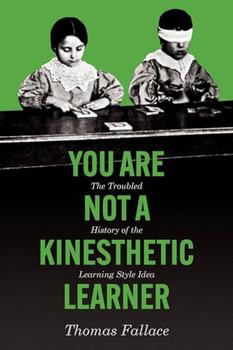
The Troubled History of the Learning Style Idea
by Thomas Fallace
A compelling history of the learning style concept and how it was shaped by shifting ideas in psychology, anthropology, and education.
The widely embraced notion that we all process information in one of three distinct modes—visual, auditory, or kinesthetic—has informed educational practices for decades. In recent years, however, numerous studies have questioned the effectiveness of aligning instruction with the alleged learning styles of individual students. So, why is it still commonplace in the literature on beneficial teaching at all levels of education?
In You Are Not a Kinesthetic Learner: The Troubled History of a Dangerous Idea, historian Thomas Fallace traces the origins, evolution, and history of the learning style idea, demonstrating its relationship to a legacy of unequal education for children of color. Fallace argues that the research supporting the learning style idea was problematic from its inception in the 1910s and that it was used to label and justify a diminished curriculum for many Black and Latine students, whose cultural differences were perceived as weaknesses. In recent years, numerous empirical studies have not found the approach to be effective. This fascinating history clearly shows the danger of sorting and labeling students with permanent style identities and makes a strong case for removing learning styles as the basis for any educators' instructional toolkit.
The first book-length history of learning styles, You Are Not a Kinesthetic Learner encourages us all to consider the research, be open to future developments and updates, and question even our most intuitive assumptions.
"Rigorous and persuasive, this is a must-read for educators." —Publishers Weekly (starred review)
"There is no empirical basis for the idea of 'learning styles.' And yet the concept has won a foothold in K-12 classrooms, on college campuses, and in the popular consciousness. So what gives? In this insightful history, Thomas Fallace unravels the mystery. In doing so, he also tells the story of American education in the past century, guiding readers across the mental testing movement, the civil rights revolution, the ongoing quest for progressive education, and the new science of learning." —Jack Schneider, author of A Wolf at the Schoolhouse Door: The Dismantling of Public Education and the Future of School
"Fallace's history of the 'learning styles' idea helps us to reckon with not only what we know about how students learn, but also how we come to believe what we do about schooling. By encouraging teachers and students alike to resist easy, inaccurate typologies and think for themselves, this incisive book challenges us to reconsider notions of educational equity." —Annie Abrams, author of Shortchanged: How Advanced Placement Cheats Students
This information about You Are Not a Kinesthetic Learner was first featured
in "The BookBrowse Review" - BookBrowse's membership magazine, and in our weekly "Publishing This Week" newsletter. Publication information is for the USA, and (unless stated otherwise) represents the first print edition. The reviews are necessarily limited to those that were available to us ahead of publication. If you are the publisher or author and feel that they do not properly reflect the range of media opinion now available, send us a message with the mainstream reviews that you would like to see added.
Any "Author Information" displayed below reflects the author's biography at the time this particular book was published.
Thomas Fallace is professor of education at William Paterson University. He is the author of In the Shadow of Authoritarianism: American Education in the Twentieth Century and Race and the Origins of Progressive Education, 1890–1929, among others.
Everywhere I go, I am asked if I think the university stifles writers...
Click Here to find out who said this, as well as discovering other famous literary quotes!
Your guide toexceptional books
BookBrowse seeks out and recommends the best in contemporary fiction and nonfiction—books that not only engage and entertain but also deepen our understanding of ourselves and the world around us.